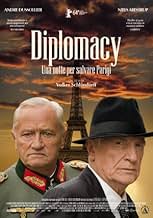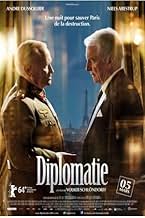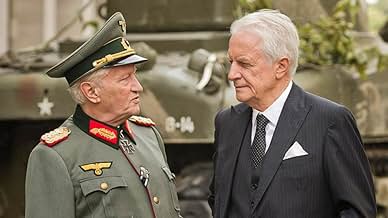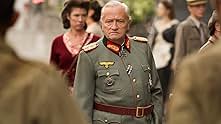Diplomatie
- 2014
- Tous publics
- 1h 24m
IMDb RATING
7.1/10
6K
YOUR RATING
A historical drama that depicts the relationship between Dietrich von Choltitz, the German military governor of occupied Paris, and Swedish consul-general Raoul Nordling.A historical drama that depicts the relationship between Dietrich von Choltitz, the German military governor of occupied Paris, and Swedish consul-general Raoul Nordling.A historical drama that depicts the relationship between Dietrich von Choltitz, the German military governor of occupied Paris, and Swedish consul-general Raoul Nordling.
- Awards
- 5 wins & 6 nominations total
Pierre-Marie Rochefort-Schneider
- Opérateur radio
- (as Pierre-Marie Rochefort)
Featured reviews
There's an old joke - how many Frenchmen does it take to defend Paris? Answer: No one knows. It's never happened.
That actually comes up in this film, "Diplomatie," from 2014, based on a play. It's basically a two-person movie about the conversation Swedish consulate Raoul Nordling (André Dussollier) has with Général von Choltitz (Niels Arestrup).
Germany has basically lost the war; the Allies are en route to Germany, and Hitler has decided to make Paris scorched earth, killing millions and razing the city to rubble. There was no strategic reason to do this. He was just feeling especially spiteful that day and figuring, why leave the Allies with this jewel.
Nordling, a Paris resident, comes to ask von Choltitz to spare Paris. Von Choltitz has never defied an order, no matter how he felt about it, and he is very dismissive of Nordling. He points out that there's practically nothing left of Hamburg - did those civilians not matter?
He tells Nordling that the Parisians gave the Nazis Paris "with their legs open - like whores. We can do what we want with it." They go back and forth on this, and von Choltitz later admits that Hitler has gone off the rails. But there's nothing he can do - his family will pay the price if he doesn't do as he's told.
This is an excellent film with superb acting by both men. The most chilling scene takes place in the beginning, when von Choltitz and soldiers go over the plan to destroy Paris. It's absolutely shocking. They go through every landmark, every famous street, discussing how it will be taken down, how the city will be flooded when they break through the river barriers. It's awful.
I knew right away that Neils Arestup was not German - I could understand every word he said. When real Germans speak, I can't. He does a masterful job, so aggressive and cold in the beginning, and then gradually weakening. André Dussollier, with his quiet performance, is excellent in his persuasiveness.
I believe the mayor of Paris and Nordling both visited von Choltitz.
Well, we all know what happened. Here in the U. S., I think sometimes World War II has been glamorized a bit as it was not fought on our soil.
For many of our fathers, it was their first time away from home and their normal lives. In reminiscing, for an 18-year-old who maybe went over at the end of the war, it was an adventure and the beginning of lifelong friendships. Sadly the outcome was not the same for all.
World War II was filthy, it wasn't the propaganda movies trying to keep our spirits up. It was a horrible war that killed many people through bombing, extermination, and starvation. For much of Europe, the aftermath wasn't that much better.
"Diplomate" is just a microcosm of one man's efforts to stop the carnage. Definitely worth seeing.
That actually comes up in this film, "Diplomatie," from 2014, based on a play. It's basically a two-person movie about the conversation Swedish consulate Raoul Nordling (André Dussollier) has with Général von Choltitz (Niels Arestrup).
Germany has basically lost the war; the Allies are en route to Germany, and Hitler has decided to make Paris scorched earth, killing millions and razing the city to rubble. There was no strategic reason to do this. He was just feeling especially spiteful that day and figuring, why leave the Allies with this jewel.
Nordling, a Paris resident, comes to ask von Choltitz to spare Paris. Von Choltitz has never defied an order, no matter how he felt about it, and he is very dismissive of Nordling. He points out that there's practically nothing left of Hamburg - did those civilians not matter?
He tells Nordling that the Parisians gave the Nazis Paris "with their legs open - like whores. We can do what we want with it." They go back and forth on this, and von Choltitz later admits that Hitler has gone off the rails. But there's nothing he can do - his family will pay the price if he doesn't do as he's told.
This is an excellent film with superb acting by both men. The most chilling scene takes place in the beginning, when von Choltitz and soldiers go over the plan to destroy Paris. It's absolutely shocking. They go through every landmark, every famous street, discussing how it will be taken down, how the city will be flooded when they break through the river barriers. It's awful.
I knew right away that Neils Arestup was not German - I could understand every word he said. When real Germans speak, I can't. He does a masterful job, so aggressive and cold in the beginning, and then gradually weakening. André Dussollier, with his quiet performance, is excellent in his persuasiveness.
I believe the mayor of Paris and Nordling both visited von Choltitz.
Well, we all know what happened. Here in the U. S., I think sometimes World War II has been glamorized a bit as it was not fought on our soil.
For many of our fathers, it was their first time away from home and their normal lives. In reminiscing, for an 18-year-old who maybe went over at the end of the war, it was an adventure and the beginning of lifelong friendships. Sadly the outcome was not the same for all.
World War II was filthy, it wasn't the propaganda movies trying to keep our spirits up. It was a horrible war that killed many people through bombing, extermination, and starvation. For much of Europe, the aftermath wasn't that much better.
"Diplomate" is just a microcosm of one man's efforts to stop the carnage. Definitely worth seeing.
This is a brilliant film.
Masterfully set in the tense historical and ideally theatrical moment, the story demonstrated that the combination of the power of the iron will and the eloquent linguistic skills, both built on the trust of the two human beings, was able to defy something impossible.
From the linguistic point of view, the film was made very realistic, switching between German and French. This is a relief, given a flood of supposedly European movies of recent with a way too many English speaking characters.
I want my children to watch this film to eyewitness the history and perhaps something more important than that: Words, not the sword, saved Paris and her people from calamity.
Masterfully set in the tense historical and ideally theatrical moment, the story demonstrated that the combination of the power of the iron will and the eloquent linguistic skills, both built on the trust of the two human beings, was able to defy something impossible.
From the linguistic point of view, the film was made very realistic, switching between German and French. This is a relief, given a flood of supposedly European movies of recent with a way too many English speaking characters.
I want my children to watch this film to eyewitness the history and perhaps something more important than that: Words, not the sword, saved Paris and her people from calamity.
"Diplomatie" (2014 release from France; 90 min.) is the big screen adaptation of the theatre play of the same name by Cyril Gely. (Disclaimer: I have not seen the theatre play.) The story takes place on the eve of the liberation of Paris in late August, 1944. The German commander-in-charge, General von Choltitz, has orders to destroy all of the main landmarks of Paris (Louvre, Eiffel Tower, Notre Dame cathedral, etc.). Enter French diplomat Raoul Nordling, who tries talking von Choltitz out of implementing the orders from Berlin. To tell you more would spoil your viewing experience, you'll just have to see for yourself how it all plays out.
Several comments: this movie is directed by none other than legendary German film maker Volker Schlöndorff, yes he of "The Tin Drum" from the late 1970s. Who knew he was still around and making movies? Second, while on some occasions there are scenes shot outside, beware that most of the movie takes place in the room at the Hotel Meurice where General von Scholtitz is based, and it truly needs to be emphasized that this is a theatre play brought to the big screen, but still very much a theatre play. Last but certainly not least, the acting performances of the two lead actors (André Dussollier as Raoul Nordling, and Niels Arestrup as General von Choltitz) are nothing short of top-notch and truly carry the film.
"Diplomatie" has garnered rave reviews in Europe, and the screening I saw this at in Antwerp, Belgium last week during a recent family visit, was very well attended. Still, I don't know to what extent this success could be replicated in the US. For me, the movie was a slight bit too static to fully engage me from start to finish. But I would readily suggest that you check this movie out if you get the chance, and draw your own conclusions.
Several comments: this movie is directed by none other than legendary German film maker Volker Schlöndorff, yes he of "The Tin Drum" from the late 1970s. Who knew he was still around and making movies? Second, while on some occasions there are scenes shot outside, beware that most of the movie takes place in the room at the Hotel Meurice where General von Scholtitz is based, and it truly needs to be emphasized that this is a theatre play brought to the big screen, but still very much a theatre play. Last but certainly not least, the acting performances of the two lead actors (André Dussollier as Raoul Nordling, and Niels Arestrup as General von Choltitz) are nothing short of top-notch and truly carry the film.
"Diplomatie" has garnered rave reviews in Europe, and the screening I saw this at in Antwerp, Belgium last week during a recent family visit, was very well attended. Still, I don't know to what extent this success could be replicated in the US. For me, the movie was a slight bit too static to fully engage me from start to finish. But I would readily suggest that you check this movie out if you get the chance, and draw your own conclusions.
When Hitler's army was on the verge of withdrawal from Paris, they were ordered to destroy all major structures, such as Louvre, Eiffel Tower et al and to pulverize the city. We all know that the city still stands with all its monuments. It is the story of that fateful night when the destiny of a city hung in balance.
The acting is great. The run time is super short (75 minutes). The twists are many. The dialogues are sharp. The debates between the two principals are thought provoking and force you to empathize.
Highly recommended. Well made.
The acting is great. The run time is super short (75 minutes). The twists are many. The dialogues are sharp. The debates between the two principals are thought provoking and force you to empathize.
Highly recommended. Well made.
Cyril Gély's play 'Diplomatie' opened at the Théatre de la Madeleine in 2011 with Niels Arestrup as Dietrich von Choltitz and André Dusollier as Raoul Nordling. It ran for three hundred performances so both actors certainly had long enough to get it right! Although the ways of Film are mysterious, when it came time to adapt the piece for the screen they were obvious choices and luckily for us they were able to reprise their roles.
The relationship between the characters of von Choltitz, Governor-General of occupied Paris and Swedish consul Nordling had been touched upon in René Clément's sprawling and star-studded epic 'Is Paris burning?' in which they were played by Gert Frobe and Orson Welles. They met on several occasions but for the dramatic purposes of the play Gély depicts one fictional meeting that takes place in the L'Hotel Meurice on the Rue de Rivoli just hours before von Choltitz is due to carry out Hitler's order to destroy Paris rather than let it to fall into the hands of the advancing Allies.
Here, as opposed to the earlier film, the emphasis is on individual rather than collective action. The means by which Nordling allegedly convinces the hard-nosed and brutal General to rescind Hitler's maniacal order are of course purely hypothetical but results in excellent theatre. Presumably Gély had access to the General's memoirs but how reliable are these one wonders? There are some who have suggested that von Choltitz is merely motivated by the desire to save his own skin, knowing that his previous military actions in Rotterdam and Sevastopol would mark him out as a war criminal(in fact he only served two years in prison) and that anyway, he lacked sufficient time and resources to carry out the order effectively. What is plausible and very much in keeping with the characters is that Nordling promises to get von Choltitz' wife and children out of Germany and into safety in Switzerland if he surrenders the city. It is known than Choltitz had previously refused to obey Himmler's order to ransack the Louvre so already the seeds of defiance were being sewn and like so many officers of the Wehrmacht he had serious doubts about Hitler's sanity. Perhaps after all Nordling wasn't required to do too much persuading.
As for the film Volker Schloendorff has done a marvellous job in sustaining our interest in what is essentially a two-hander. The camerawork of Michel Amathieu is excellent and although shot in colour the contrasts between light and dark aid the drama immeasurably. The director mainly keeps the action within the proscenium arch but a filmically effective scene is where von Choltitz rescinds the order whilst on the roof of the hotel so that both he and the audience have the panorama of Paris in view.
Schloendorff has achieved a perfect balance here between film and filmed theatre and has the advantage in Arestrup and Dusollier of two consummate professionals at the top of their game.
Seventy-five years on it is difficult to appreciate just how close Paris came to destruction. One would dearly love to believe that Nordling's arguments won the day as it gives us a feeling that maybe, just maybe, 'the strength of one in tongue and speech is mightier than all fighting.' We live in hopes!
The relationship between the characters of von Choltitz, Governor-General of occupied Paris and Swedish consul Nordling had been touched upon in René Clément's sprawling and star-studded epic 'Is Paris burning?' in which they were played by Gert Frobe and Orson Welles. They met on several occasions but for the dramatic purposes of the play Gély depicts one fictional meeting that takes place in the L'Hotel Meurice on the Rue de Rivoli just hours before von Choltitz is due to carry out Hitler's order to destroy Paris rather than let it to fall into the hands of the advancing Allies.
Here, as opposed to the earlier film, the emphasis is on individual rather than collective action. The means by which Nordling allegedly convinces the hard-nosed and brutal General to rescind Hitler's maniacal order are of course purely hypothetical but results in excellent theatre. Presumably Gély had access to the General's memoirs but how reliable are these one wonders? There are some who have suggested that von Choltitz is merely motivated by the desire to save his own skin, knowing that his previous military actions in Rotterdam and Sevastopol would mark him out as a war criminal(in fact he only served two years in prison) and that anyway, he lacked sufficient time and resources to carry out the order effectively. What is plausible and very much in keeping with the characters is that Nordling promises to get von Choltitz' wife and children out of Germany and into safety in Switzerland if he surrenders the city. It is known than Choltitz had previously refused to obey Himmler's order to ransack the Louvre so already the seeds of defiance were being sewn and like so many officers of the Wehrmacht he had serious doubts about Hitler's sanity. Perhaps after all Nordling wasn't required to do too much persuading.
As for the film Volker Schloendorff has done a marvellous job in sustaining our interest in what is essentially a two-hander. The camerawork of Michel Amathieu is excellent and although shot in colour the contrasts between light and dark aid the drama immeasurably. The director mainly keeps the action within the proscenium arch but a filmically effective scene is where von Choltitz rescinds the order whilst on the roof of the hotel so that both he and the audience have the panorama of Paris in view.
Schloendorff has achieved a perfect balance here between film and filmed theatre and has the advantage in Arestrup and Dusollier of two consummate professionals at the top of their game.
Seventy-five years on it is difficult to appreciate just how close Paris came to destruction. One would dearly love to believe that Nordling's arguments won the day as it gives us a feeling that maybe, just maybe, 'the strength of one in tongue and speech is mightier than all fighting.' We live in hopes!
Did you know
- Quotes
Général von Choltitz: Do you know what we do to men like you?
Raoul Nordling: Give them a medal?
Général von Choltitz: [breaking a smile] Yes, on occasion.
[stern again]
Général von Choltitz: Posthumously.
- ConnectionsFeatured in Diplomatie: Making of (2015)
- SoundtracksLa 7ème symphonie
Music by Ludwig van Beethoven (as Beethoven)
Conducted by Wilhelm Furtwängler
Berlin 1943 © Société Wilhelm Furtwängler
Performed by Berliner Philharmoniker (uncredited)
Details
- Release date
- Countries of origin
- Official site
- Languages
- Also known as
- Diplomacy
- Filming locations
- Jardin des Tuileries, Paris 1, Paris, France(city park in front of the hotel)
- Production companies
- See more company credits at IMDbPro
Box office
- Gross US & Canada
- $230,880
- Opening weekend US & Canada
- $8,518
- Oct 19, 2014
- Gross worldwide
- $4,207,242
- Runtime1 hour 24 minutes
- Color
- Sound mix
- Aspect ratio
- 2.35 : 1
Contribute to this page
Suggest an edit or add missing content





























